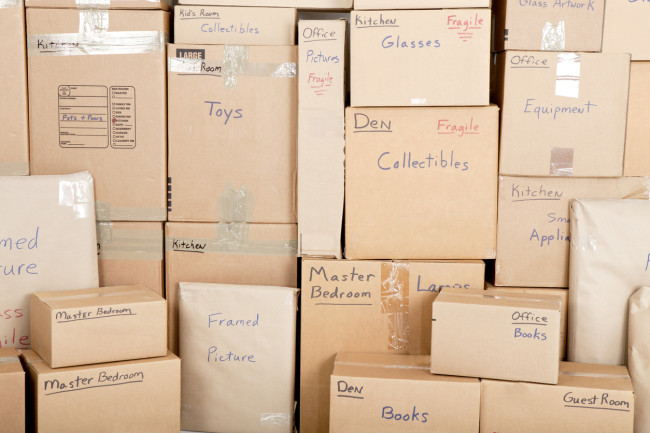The biggest mistakes to avoid when moving within NYC

iStock
Moving is a dreaded task and in New York City, where you have lots of walk-up apartments, tight hallways, and difficulty parking, it’s even more complicated.
But there are several things you can do in advance of moving day to make the experience go smoothly, moving company owners tell Brick Underground. Often, it comes down to avoiding some very common pitfalls. Movers say that being realistic about how much stuff you have, describing your building accurately, and asking the right questions about what your movers will and will not do for you can make all the difference.
[For more tips, Brick Underground has a round up of best advice on moving.]
Read on for what moving companies say are the biggest mistakes people make when moving in NYC—and how to prevent them:
Mistake #1: Being unrealistic about your stuff
Take the time to go through every room and do a physical inventory, as opposed to a mental one, before contacting a moving company for an estimate. It’s helpful to use a checklist, and some moving companies will provide one for download from their website.
“One of the biggest preventable issues in moving is when renters provide an inaccurate description of what they’re looking for and the inventory they have,” says Dylan Kindler, co-owner of CityMove, a reverse-bidder site for movers. “Reality versus expectations are mismatched and it screws up the whole process.”
You also need to communicate details about the buildings you are leaving and moving into: Are you in a walk-up or an elevator building? What neighborhood do you live in? How far is the move? Look for factors that may impact that how long the move will take and relay them to the moving company. A good rule of thumb: If you had trouble moving something in, you’ll have trouble moving it out.
Mistake #2: Not vetting your moving company
With so many competing moving companies out there, it can be hard to know who’s good and who may break your furniture. Kindler says you should take Yelp reviews with a grain of salt.
“They can be manipulated, and since Yelp doesn’t strictly verify its reviewers, companies can request reviews from some people who are likely to give five stars,” he explains. At the very least, crosscheck reviews across multiple sites.
Word-of-mouth recommendations from friends are the best way to choose a mover, but you can also ask your broker (if you’re using one) for recommendations.
Mistake #3: Getting the wrong rate or service
Matthew Stewart, the director of sales at Movers, Not Shakers!, an eco-friendly moving company, recommends trying to get a flat rate instead of an hourly rate.
“If you’re moving very locally and you have very little stuff, hourly might make sense, but otherwise you’ll be much more comfortable getting a rate you know won’t change,” he says.
For a thorough price check, check out Brick Underground’s “What it costs to move to a NYC apartment.”
Almost every moving service will offer packing services as well, which can be a great service if you’re willing to pay for it. You can do it a la carte—they don’t have to pack everything. “I’ve had movers pack impersonal things (furniture, kitchen items) but not personal things (clothing, valuable items),” says Kindler.
If you plan on having your movers pack, you need to communicate that ahead of time Generally, movers will be ready day-of to pack anything that doesn’t go in boxes, and they’ll protect and wrap all large furniture. But they won’t be prepared to put things in boxes for you unless you specifically request it.
Mistake #4: Picking the wrong moving day
Some residences limit moving on the weekend and/or holidays, especially in an elevator building, so check restrictions with the building’s management ahead of time. Many elevator buildings will not allow you to tie up an elevator on a weekend, when owners or tenants are home.
Every company Brick spoke with recommended moving in the middle of the week or month, if at all possible. You will get much cheaper rates that way, and more crews and trucks will be available. That also gives you more leeway in case the move takes longer than expected.
Summer months are also busier than winter months. “One of the movers we worked with reported they had to turn down 80 clients for one June weekend,” Kindler says. “If you do have to move those times, call early, and know you’ll have to pay more for those days.”
Mistake #5: Packing stuff you no longer want or need
Do you have a rack of clothes that no longer spark joy? Now is the time to take them to Goodwill. The time to edit your belongings is at your old residence, not after the move.
“Consider donating old furniture or clothes to charity before your move,” says Lior Rachmany, founder and CEO of Dumbo Moving + Storage. You’ll receive a tax benefit form for the items you’re donating, he says.
Be honest with yourself about what you do and do not need. “The box you haven’t unpacked since your last move might not be something you need in your life,” Stewart says. Most moving companies will donate your items free of charge.
Mistake #6: Creating more waste
Moving produces an incredible amount of waste in the form of packing materials and discarded items. Some companies supply reusable packing containers and drop off unwanted items for recycling or reuse.
See if your moving company offers sustainable solutions for things you do want to get rid of, such as taking old clothes and items to Salvation Army or Build It Green, and recycling old electronics instead of leaving them out for the trash. “Electronics make up a very small part of landfill content, but they contain a huge amount of contaminants, with mercury and other toxic chemicals,” says Stewart.
Movers, Not Shakers! and Dumbo Moving + Storage are two of a growing number of moving companies who will rent out reusable storage and moving containers. “They not only are stable and waterproof, but they also are environmentally friendly,” Rachmany says.
If you have to use cardboard, try to find a way to recycle it after the move.
Mistake #7: Not treating your movers well
Your movers are people, too. Just because you’ve hired a moving company doesn’t mean the move will happen by magic.
There are several things you can do to make the move easier on your movers and earn their goodwill:
- Don’t make boxes extremely heavy. In other words, large boxes are not for books. A good rule of thumb is that an average adult of average strength should be able to move the box.
- Measure your doorways and stairways/elevator. This will help your movers determine what is feasible. “You will have to let your movers know ahead of time what these measurements are and how many flights your apartment is up,” Rachmany says.
- Empty out everything from your furniture. Don’t leave clothes in your dresser. It could get turned on its side or upside down to fit in the truck.
- Label stuff thoroughly. This is a major pet peeve of all movers. As you pack, label your boxes with their ultimate destination in your new apartment. Kindler suggests a color-coded system so your movers can quickly tell what goes with what.
- Be realistic. if you’re moving from a one bedroom to a two bedroom, determine ahead of time how will you separate your stuff into your increased space.
A final note: It’s expected in NYC that you’ll tip your movers. Fifteen to 20 percent is considered standard. Read our interview with a New York mover for thoughts on tipping and more.
You Might Also Like


























